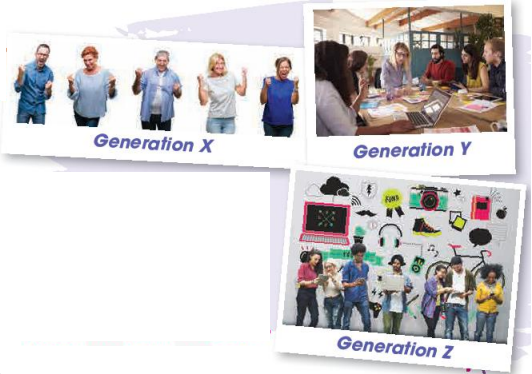Tiếng Anh 11 Unit 2 Reading1. Work in pairs. Look at the photos. Discuss what you know about the generation in each picture (e.g. age, characteristics, interests, life experiences). 2. Read the article. Match the highlighted words with their meanings. 3. Read the article again and choose the best title. 4. Read the article again. Tick (✔) the characteristics of each generation according to the article. 5. Work in groups. Discuss the following question. Tổng hợp đề thi học kì 2 lớp 11 tất cả các môn - Kết nối tri thức Toán - Văn - Anh - Lí - Hóa - Sinh
Lựa chọn câu để xem lời giải nhanh hơn
Bài 1 Video hướng dẫn giải Different generations (Những thế hệ khác nhau) 1. Work in pairs. Look at the photos. Discuss what you know about the generation in each picture (e.g. age, characteristics, interests, life experiences). (Làm việc theo cặp. Nhìn vào những bức ảnh. Thảo luận những gì bạn biết về thế hệ trong mỗi bức tranh (ví dụ: tuổi tác, đặc điểm, sở thích, kinh nghiệm sống).
Lời giải chi tiết: Generation X includes those born between 1965 and 1981, during the reconstruction of Europe after the war. They are less dependent on smartphones than the next generations. (Thế hệ X bao gồm những người sinh từ năm 1965 đến 1981, trong thời kỳ tái thiết châu Âu sau chiến tranh. Họ ít phụ thuộc vào smartphone hơn các thế hệ tiếp theo.) Generation Y is those born between 1982 and 1994 and technology is part of their everyday lives: all their activities are mediated by a screen. However, the millennial generation is labelled as being lazy, narcissistic and spoilt. (Thế hệ Y là những người sinh từ năm 1982 đến 1994 và công nghệ là một phần trong cuộc sống hàng ngày của họ: mọi hoạt động của họ đều được điều khiển bởi màn hình. Tuy nhiên, thế hệ Y bị coi là lười biếng, tự ái và hư hỏng.) Generation Z were born between1995 and 2010 — they arrived with a tablet and a smartphone under their arms. It is a group of people that is marked by the Internet. Their mastery of technologies may make them neglect their interpersonal relationships to a greater extent, but they are the ones who give more of a voice to social causes on the Internet. (Thế hệ Z sinh năm 1995 đến 2010 - họ được cung cấp một chiếc máy tính bảng và điện thoại thông minh. Đó là một nhóm người được đánh dấu bởi Internet. Sự thông thạo công nghệ của họ có thể khiến họ bỏ bê các mối quan hệ giữa các cá nhân ở mức độ lớn hơn, nhưng họ là những người đưa ra nhiều tiếng nói hơn cho các hoạt động xã hội trên Internet.) Bài 2 Video hướng dẫn giải 2. Read the article. Match the highlighted words with their meanings. (Đọc bài báo. Nối các từ được đánh dấu với nghĩa của chúng.) Over the past two centuries, different generations were born and given different names. Each generation comes with its characteristics, which are largely influenced by the historical, economic, and social conditions of the country they live in. However, in many countries the following three generations have common characteristics. Generation X refers to the generation born between 1965 and 1980. When Gen Xers grew up, they experienced many social changes and developments in history. As a result, they are always ready for changes and prepared to work through changes. Gen Xers are also known as critical thinkers because they achieved higher levels of education than previous generations. Generation Y, also known as Millennials, refers to those born between the early 1980s and late 1990s. They are curious and ready to accept changes. If there is a faster, better way of doing something, Millennials want to try it out. They also value teamwork. When working in a team, Millennials welcome different points of view and ideas from others. Generation Z includes people born between the late 1990s and early 2010s, a time of great technological developments and changes. That is why Gen Zers are also called digital natives. They grew up online and never knew the world before digital and social media. They are very creative and able to experiment with platforms to suit their needs. Many Gen Zers are also interested in starting their own businesses and companies. They saw so many people lose their jobs, so they think it is safer to be your own boss than relying on someone else to hire you. Soon a new generation, labelled Gen Alpha, will be on the scene. Let's wait and see if we will notice the generation gap.
Phương pháp giải: Tạm dịch văn bản: Trong hai thế kỷ qua, các thế hệ khác nhau được sinh ra và được đặt tên khác nhau. Mỗi thế hệ có những đặc điểm riêng, phần lớn bị ảnh hưởng bởi điều kiện lịch sử, kinh tế, xã hội của quốc gia mà họ sinh sống. Tuy nhiên, ở nhiều quốc gia, ba thế hệ sau lại có những đặc điểm chung. Thế hệ X là thế hệ sinh từ năm 1965 đến năm 1980. Khi Gen X lớn lên, họ đã trải qua nhiều thay đổi xã hội và sự phát triển trong lịch sử. Kết quả là, họ luôn sẵn sàng cho những thay đổi và sẵn sàng vượt qua những thay đổi. Gen Xers còn được gọi là những người có tư duy phản biện vì họ đạt trình độ học vấn cao hơn các thế hệ trước. Thế hệ Y, còn được gọi là Millennials, dùng để chỉ những người sinh từ đầu những năm 1980 đến cuối những năm 1990. Họ tò mò và sẵn sàng chấp nhận thay đổi. Nếu có một cách nhanh hơn, tốt hơn để làm điều gì đó, Millennials muốn thử nó. Họ cũng coi trọng tinh thần đồng đội. Khi làm việc theo nhóm, Millennials hoan nghênh những quan điểm và ý tưởng khác biệt từ những người khác. Thế hệ Z bao gồm những người sinh từ cuối những năm 1990 đến đầu những năm 2010, thời điểm của những thay đổi và phát triển công nghệ vượt bậc. Đó là lý do tại sao Gen Zers còn được gọi là người bản địa kỹ thuật số. Họ lớn lên trên mạng và chưa từng biết đến thế giới trước mạng xã hội và kỹ thuật số. Họ rất sáng tạo và có thể thử nghiệm các nền tảng phù hợp với nhu cầu của họ. Nhiều Gen Z cũng quan tâm đến việc thành lập doanh nghiệp và công ty của riêng họ. Họ thấy rất nhiều người mất việc, vì vậy họ nghĩ rằng tự mình làm chủ sẽ an toàn hơn là nhờ người khác thuê mình. Chẳng bao lâu nữa, một thế hệ mới, được gọi là Gen Alpha, sẽ xuất hiện. Hãy cùng chờ xem liệu chúng ta có nhận thấy khoảng cách thế hệ hay không. Lời giải chi tiết:
1 - b. experienced - went through (có kinh nghiệm - đã trải qua) 2 -d. curious - wanting to know about something (tò mò – muốn biết về điều gì đó) 3 - e. digital natives - people born in the era of technology (những người sinh ra và sống trong thời đại kỹ thuật số - người sinh trong thời kì kĩ thuật số) 4 - a. experiment - to try or test new ideas or methods (thử nghiệm - để thử hoặc kiểm tra những ý tưởng hoặc phương pháp mới) 5 - c. hire – to employ (thuê – tuyển dụng) Bài 3 Video hướng dẫn giải 3. Read the article again and choose the best title. (Đọc bài báo một lần nữa và chọn tiêu đề đúng nhất.) A. The study of different generations (Nghiên cứu về các thế hệ khác nhau) B. Generational differences in different societies (Sự khác biệt về thế hệ trong các xã hội khác nhau) C. Characteristics of different generations (Đặc điểm của các thế hệ khác nhau) Lời giải chi tiết: C. Characteristics of different generations (Đặc điểm của các thế hệ khác nhau) Thông tin: Each generation comes with its characteristics, which are largely influenced by the historical, economic, and social conditions of the country they live in. (Mỗi thế hệ có những đặc điểm riêng, phần lớn bị ảnh hưởng bởi điều kiện lịch sử, kinh tế, xã hội của quốc gia mà họ sinh sống.) Bài 4 Video hướng dẫn giải 4. Read the article again. Tick (✔) the characteristics of each generation according to the article. (Đọc bài báo một lần nữa. Tick (✔) vào đặc điểm của mỗi thế hệ theo bài viết.)
Lời giải chi tiết:
1. Generation Y: They enjoy working in a team with others. (Họ thích làm việc trong một nhóm với những người khác.) Thông tin: They also value teamwork. (Họ coi trọng tinh thần đồng đội.) 2. Generation Z: They can use apps and digital devices in creative ways. (Họ có thể sử dụng các ứng dụng và thiết bị kĩ thuật một cách sáng tao.) Thông tin: They are very creative and able to experiment with platforms to suit their needs. (Họ rất sáng tạo và có thể thử nghiệm các nền tảng phù hợp với nhu cầu của họ.) 3. Generation X: Critical thinking is one of their common characteristics. (Tư duy phản biện là một trong những đặc điểm phổ biến của họ.) Thông tin: Gen Xers are also known as critical thinkers because they achieved higher levels of education than previous generations. (Gen Xers còn được gọi là những người có tư duy phản biện vì họ đạt trình độ học vấn cao hơn các thế hệ trước.) 4. Generation Z: Most of them plan to have their own businesses. (Hầu hết họ có kế hoạch tự kinh doanh.) Thông tin: so they think it is safer to be your own boss than relying on someone else to hire you. (vì vậy họ nghĩ rằng tự mình làm chủ sẽ an toàn hơn là nhờ người khác thuê mình.) 5. Generation Y: They are known for their curiosity. (Họ được biết đến vì sự tò mò.) Thông tin: They are curious and ready to accept changes. (Họ tò mò và sẵn sàng chấp nhận thay đổi.) Bài 5 Video hướng dẫn giải 5. Work in groups. Discuss the following question. (Làm việc theo nhóm. Thảo luận câu hỏi dưới đây.) Do you agree with the descriptions of each generation? (Bạn có đồng ý với các mô tả của mỗi thế hệ?) Lời giải chi tiết: Yes, I do. The descriptions of each generation are accurate. Each trait is described in a specific way and has compelling evidence.The characteristics of each generation are clearly described, based on the development of the social sciences. (Em đồng ý. Các mô tả của mỗi thế hệ là chính xác. Mỗi đặc điểm được mô tả một cách cụ thể và có bằng chứng thuyết phục. Đặc điểm của mỗi thế hệ được mô tả rõ ràng, dựa vào sự phát triển của khoa học xã hội.)
>> 2K9 Học trực tuyến - Định hướng luyện thi TN THPT, ĐGNL, ĐGTD ngay từ lớp 11 (Xem ngay) cùng thầy cô giáo giỏi trên Tuyensinh247.com. Bứt phá điểm 9,10 chỉ sau 3 tháng, tiếp cận sớm các kì thi.
|






















